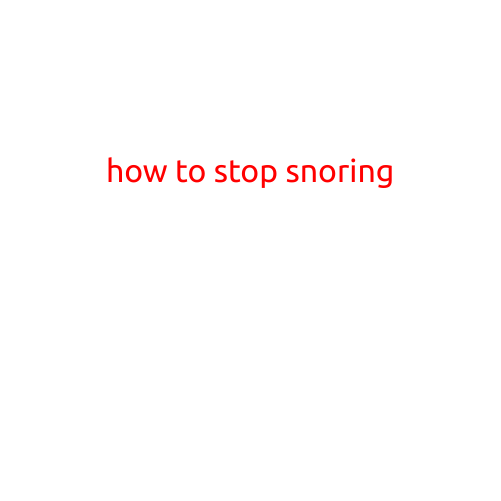
How to Stop Snoring: Effective Methods and Strategies
Snoring is a common problem that affects millions of people around the world. It can be a source of embarrassment, frustration, and even disrupt sleep patterns for both the snorer and their partner. While it’s a normal part of sleep for some, for others, it can be a sign of underlying sleep disorders or health issues. In this article, we’ll explore the causes of snoring, its effects on health, and most importantly, provide effective methods and strategies on how to stop snoring.
What Causes Snoring?
Snoring occurs when the tissues in the back of the throat relax and vibrate during sleep, causing the airway to narrow and produce the characteristic snoring sound. Several factors can contribute to snoring, including:
- Obstruction of the airway: When the tongue, soft palate, or tonsils block the airflow, it can cause snoring.
- Fat in the throat: Excess fat around the neck and throat area can narrow the airway, leading to snoring.
- Jaw alignment: An incorrectly aligned jaw can cause the tongue to fall back and obstruct the airway.
- Alcohol consumption: Drinking too much alcohol before bed can relax the muscles, leading to snoring.
- Sleep position: Sleeping on your back can cause the tongue and soft palate to fall back and block the airway.
Effects of Snoring on Health
Snoring is not just an embarrassing issue; it can have serious consequences on overall health. Chronic snoring can lead to:
- Sleep deprivation: Snoring can disrupt sleep patterns, leading to fatigue, irritability, and decreased productivity.
- Daytime sleepiness: Snoring can cause excessive daytime sleepiness, which can affect daily activities.
- Increased risk of sleep disorders: Snoring can be a sign of underlying sleep disorders, such as sleep apnea, which can increase the risk of cardiovascular disease and stroke.
- Strained relationships: Snoring can cause relationship problems, as it can be a source of frustration and embarrassment for both partners.
How to Stop Snoring
Fortunately, there are many effective methods and strategies to help stop snoring. Here are some of the most promising ones:
- Lose weight: If you’re overweight, losing a few pounds can help reduce the fat in your throat and alleviate snoring.
- Sleep on your side: Sleeping on your side can help keep your airway open and reduce snoring.
- Elevate the head: Raising the head of your bed by 4-6 inches can help keep your airway open and reduce snoring.
- Avoid alcohol and sedatives: Avoiding substances that can relax your muscles, such as alcohol and sedatives, can help reduce snoring.
- Try sleep aids: Using sleep aids, such as nasal strips or dilators, can help widen the airway and reduce snoring.
- Practice good sleep hygiene: Establishing a consistent sleep schedule, avoiding caffeine and electronics before bed, and creating a relaxing sleep environment can all help improve sleep quality and reduce snoring.
Advanced Treatments for Snoring
If you’re a severe snorer or snore loudly, there are more advanced treatments available. These include:
- Nasal strips: Adhesive strips that can be placed on the nose to widen the nasal passages and reduce snoring.
- Oral appliances: Devices that fit into the mouth to help advance the lower jaw and keep the airway open.
- Surgery: Surgery can be performed to remove excess tissue in the throat or realign the jaw.
- Continuous positive airway pressure (CPAP) therapy: A machine that delivers air Pressure through a mask to keep the airway open.
Conclusion
Snoring is a common issue that can have significant effects on health and relationships. By understanding the causes of snoring and using the effective methods and strategies outlined in this article, it’s possible to reduce or stop snoring altogether. Remember to always consult with a healthcare professional before trying any new treatments or remedies. With a commitment to improving sleep quality and addressing underlying health issues, you can say goodbye to snoring and hello to a better night’s sleep.





